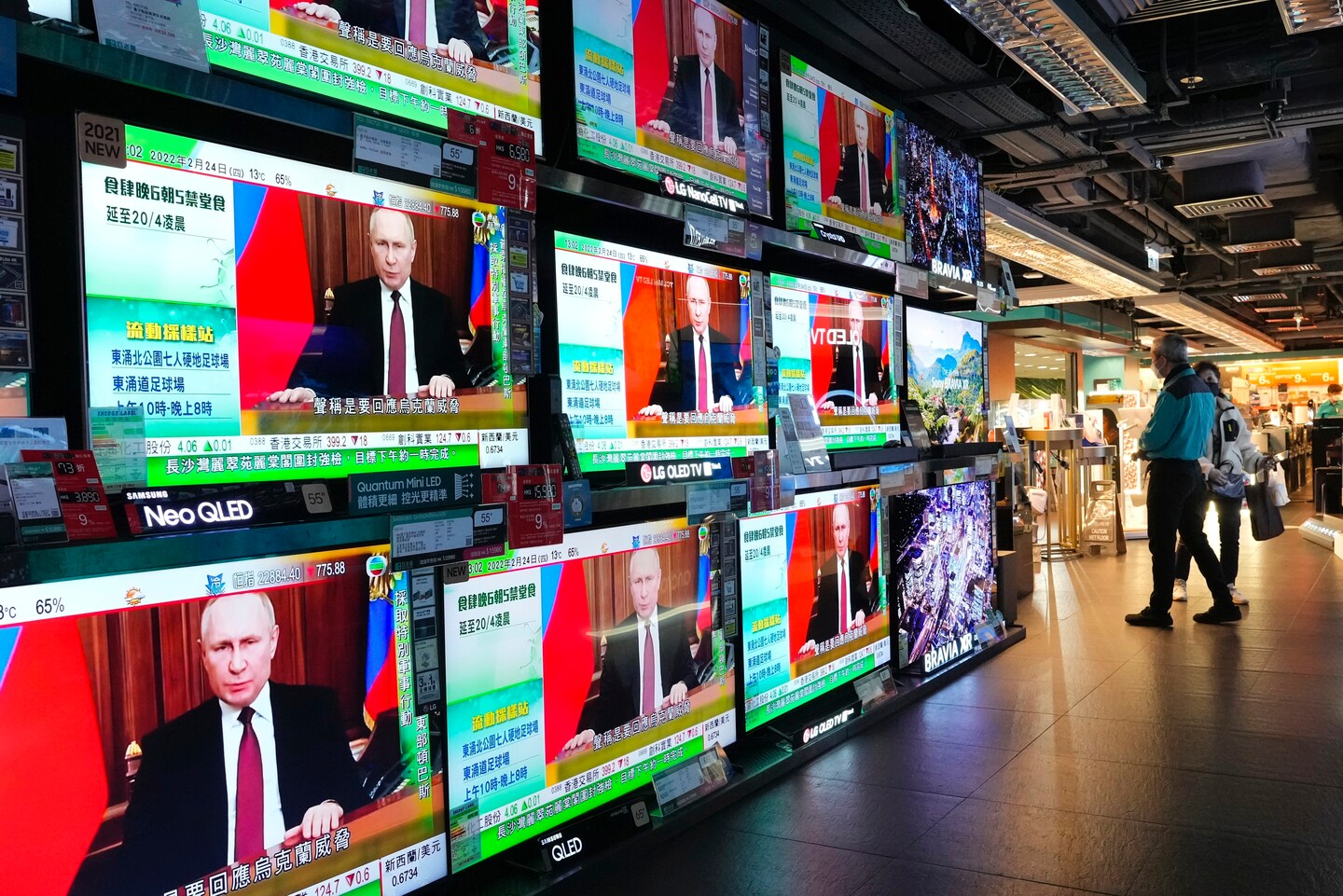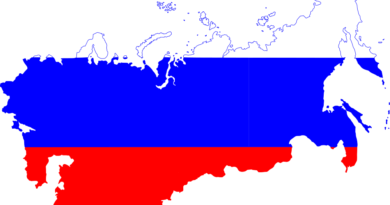China’s appearance of neutrality in Ukraine war undermined by strong Russian tilt

“Their argument was that language had been moving, albeit subtly, to show displeasure with Russia,” Blanchette said about the discussion during the “track-two” nongovernmental exchange. “That struck us as pretty weak sauce.”
Three weeks into the largest military clash in Europe since World War II, China’s effort to displease neither Russia nor the international coalition imposing sanctions on Putin is looking increasingly untenable.
A disconnect is growing between the image of neutrality Beijing wants to project and President Xi Jinping’s long-term strategy of fostering ties with Russia as a critical partner in the standoff with the United States and its allies.
Pressure from Western governments — and from pockets of Chinese academia and public opinion — is mounting on the Chinese leadership to use its economic ties with Russia to force a cease-fire. But to do so is a risk for Chinese leaders, who have little experience dealing with geopolitical crises far from their shores.
“The majority of the international community is very displeased by China’s position, and China’s international image may not get better as a result,” said Tong Zhao, a Beijing-based fellow at the Carnegie Endowment for International Peace. “It looks like China isn’t very skilled at playing international geopolitical games.”
Despite some attempts to distance itself from Russia, he said, Beijing’s approach remains fundamentally the same and “very generic, because I don’t think China knows at this moment what major policy changes it should adopt.”
Among shifts in wording was Xi’s decision to call the invasion a “war” for the first time when speaking to his German and French counterparts last week — a departure from weeks of officials describing the war as a “special military operation” or a “situation.”
China’s ambassador to Ukraine, Fan Xianrong, on Monday met with the head of the Lviv regional administration and promised that China would be “a good force for Ukraine both economically and politically.”
These tweaks in diplomatic messaging and overtures toward Ukraine have been seized upon as positive signals by those in Europe who are eager for China to use its leverage over Russia to push for a negotiated settlement.
But their hopes probably are unfounded, according to Andrew Small, a senior transatlantic fellow at the German Marshall Fund. “There are small bits of tactical positioning to deal with the fallout of the backing they have extended to Russia, but nothing deviates from the fundamentals of support [for Putin],” he said.
Chinese Foreign Minister Wang Yi has suggested that his country is willing to mediate, but China has little experience in playing peacemaker in international disputes. For years in China, foreign policy has been an extension of domestic political priorities, where the top priority is preserving regime security.
The few times that China has been directly involved in talks have involved issues in its immediate sphere of influence, such as hosting the six-party talks to slow North Korea’s nuclear and missile development programs, or arranging talks between rebel groups and the junta in Myanmar to avoid a refugee crisis on the China-Myanmar border.
The best China could do, Small said, would be to host meetings or shuttle messages between parties, but officials lack the understanding or incentive to pressure parties toward a lasting settlement. “They aren’t going to run around coming up with new proposals for security arrangements in Europe, because it might blow up in their faces,” he said.
China’s efforts to cast itself as a neutral party were further undermined when its Foreign Ministry last week lent support to Russian conspiracy theories about U.S.-backed bioweapons programs in Ukraine.
“This bodes ill not only for China’s relationship with the United States, but also for its ties with Europe,” analysts at the Alliance for Securing Democracy wrote in a recent study of coordinated Chinese-Russian disinformation. “China’s response to Russia’s invasion is seen as a litmus test — and Beijing is failing.”
There are arguments within China that Beijing is making a tactical error in sticking with Moscow and lashing out at the West. An unusually frank essay by a senior Chinese scholar published over the weekend argued that the attempt to split the difference between Russia and the West could alienate much of the world and leave China worse off.
To safeguard China’s interests, Beijing should choose “the lesser of two evils, and unloading the burden of Russia as soon as possible,” wrote Hu Wei, the vice chairman of the Public Policy Research Center of the Counselor’s Office of the State Council, China’s cabinet. “At present, it is estimated that there is still a window period of one or two weeks before China loses its wiggle room. China must act decisively.”
China’s leadership appears unmoved by such appeals. Hu’s article was censored soon after it was published.
Chinese officials instead promote Russia’s “principle of indivisible security” and argue that Putin’s security concerns are legitimate and caused by the expansion of NATO and Western support for “color revolutions” and democratic reforms. Although Chinese officials maintain that China supports peace and ending the war as soon as possible, state media are overwhelmingly pro-Russian in their reporting, and antiwar voices and commentary have been silenced.
In a year when Xi is expected to break with tradition and take on a controversial third term and extend his rule over the country indefinitely, a U-turn on the Ukraine crisis is unthinkable.
“A dramatic change on Russia is going to raise questions about his leadership,” said Yun Sun, the director of the China program at the Stimson Center.
Many of Russia’s concerns about U.S. ideological hegemony and Western security blocs are ones China shares. Watching how Western countries pressure Russia may have cemented a view that repairing relations with the West is a lost cause.
“This only contributes to Chinese view that the West’s next strategic target is China, and there is going to be a showdown between China and the West sooner or later,” Zhao said.
The foundational shift in China’s position toward Russia can be seen by comparing its response to Ukraine against how it dealt with Putin’s annexation of Crimea in 2014. Then, Beijing adopted a far more cautious stance, never recognized Russia’s claim and steered well clear of supporting Moscow’s demands for NATO to be rolled back to its smaller, pre-1997 status.
This time, while China has voiced dismay about the conflict, its support for Russia’s anti-NATO stance has not wavered.
“This is a long-term bet that Xi Jinping has made,” said Small, the German Marshall Fund fellow. “There are a lot of relationships that China has been willing to write off, but there is also a view that you stick to certain countries and Russia is one you will bend over backward for.”


![The Financial Jigsaw Part 2 (47) – THE RULING ELITE – Faith & Reason – FSD – Ukraine SitRep – UK High St, Decline – UK News Flash – Global South Challenge – Who is Kier Starmer? – [06-07-25] The Financial Jigsaw Part 2 (47) – THE RULING ELITE – Faith & Reason – FSD – Ukraine SitRep – UK High St, Decline – UK News Flash – Global South Challenge – Who is Kier Starmer? – [06-07-25]](https://wp.fifu.app/conspiracyresource.com/aHR0cHM6Ly9zdWJzdGFja2Nkbi5jb20vaW1hZ2UvZmV0Y2gvd18xNDU2LGNfbGltaXQsZl9hdXRvLHFfYXV0bzpnb29kLGZsX3Byb2dyZXNzaXZlOnN0ZWVwL2h0dHBzJTNBJTJGJTJGc3Vic3RhY2stcG9zdC1tZWRpYS5zMy5hbWF6b25hd3MuY29tJTJGcHVibGljJTJGaW1hZ2VzJTJGYWQzMmI2ZjktOTg2ZC00MjJhLTlhN2MtZjI4NTgwZWZlNWQzXzk4NHg1NTIucG5n/9c1878938158/the-financial-jigsaw-part-2-47-the-ruling-elite-faith-reason-fsd-ukraine-sitrep-uk-high-st-decline-uk-news-flash-global-s.webp?w=390&h=205&c=0&p=502592)